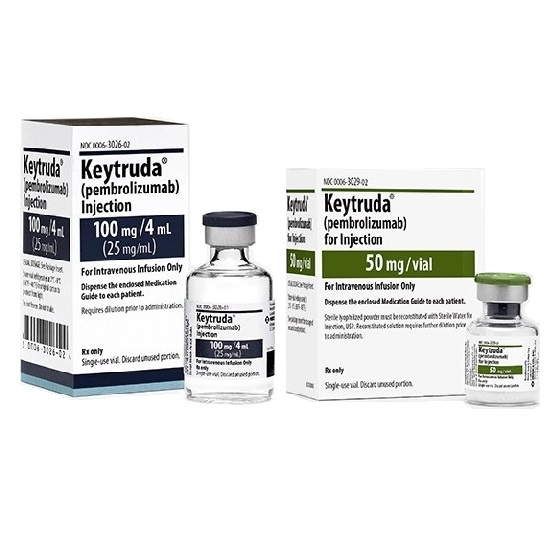KENILWORTH, N.J.--October 22, 2021
Merck (NYSE: MRK), known as MSD outside the United States and Canada, announced that the European Commission (EC) has approved KEYTRUDA, Merck’s anti-PD-1 therapy, in combination with chemotherapy for the first-line treatment of locally recurrent unresectable or metastatic triple-negative breast cancer (TNBC) in adults whose tumors express PD-L1 (Combined Positive Score [CPS] ≥10) and who have not received prior chemotherapy for metastatic disease.
This represents KEYTRUDA’s first approval in Europe in a breast cancer setting.
The approval is based on final analysis from the Phase 3 KEYNOTE-355 trial, in which KEYTRUDA in combination with chemotherapy (nab-paclitaxel, paclitaxel or gemcitabine/carboplatin) significantly improved overall survival (OS), reducing the risk of death by 27% (HR=0.73 [95% CI, 0.55-0.95]; p=0.0093), and progression-free survival (PFS), reducing the risk of disease progression or death by 34% (HR=0.66 [95% CI, 0.50-0.88]; p=0.0018) compared to chemotherapy alone in these patients. In this trial, 38% of enrolled patients had tumors expressing PD-L1 with CPS ≥10.
This approval allows marketing of the combination with KEYTRUDA in all 27 European Union member states plus Iceland, Lichtenstein, Norway and Northern Ireland.
About KEYTRUDA® (pembrolizumab) Injection, 100 mg

KEYTRUDA is an anti-programmed death receptor-1 (PD-1) therapy that works by increasing the ability of the body’s immune system to help detect and fight tumor cells. KEYTRUDA is a humanized monoclonal antibody that blocks the interaction between PD-1 and its ligands, PD-L1 and PD-L2, thereby activating T lymphocytes which may affect both tumor cells and healthy cells.
About Triple-Negative Breast Cancer
Triple-negative breast cancer is a type of breast cancer that tests negative for estrogen hormone receptors, progesterone hormone receptors and overexpression of human epidermal growth factor receptor 2 (HER2). It is an aggressive type of breast cancer that characteristically has a high recurrence rate within the first five years after diagnosis. Approximately 10-15% of patients with breast cancer are diagnosed with TNBC, which tends to be more common in people who are younger than 40 years of age, who are Black or who have a BRCA1 mutation.
SOURCE
https://www.merck.com/news/european-commission-approves-mercks-keytruda-pembrolizumab-plus-chemotherapy-as-treatment-for-certain-patients-with-locally-recurrent-unresectable-or-metastatic-triple-negative-breast/